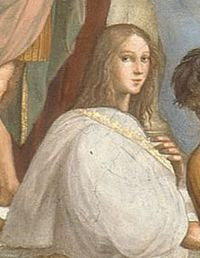Author Faith L. Justice on Hypatia, Lady Philosopher of Alexandria
Hypatia as imagined by Raphael
The most scandalous thing about the famous mathematician and philosopher Hypatia was her brutal murder at the hands of a mob in AD 415. Why would a mob of any kind, much less one led by Christian monks, haul a 60-year-old scholarly woman from her chariot, hack her body apart with pieces of pottery, and burn the bits outside the walls of Alexandria? Historians, writers and poets have tried to solve that mystery throughout the ages.
What we actually know about Hypatia is sketchy, but well laid out in Hypatia of Alexandria by Maria Dzielska (1995 Harvard Press). Most of what we know comes from the surviving letters of one of her former students, Synesius (later Bishop of Ptolemais) who extravagantly admired his teacher and called her his "divine guide." Although known for her writing on mathematics and science, Hypatia's first love was a form of philosophy which required a strict moral code, extensive study, and meditation. She wasn't a "pagan" in the traditional sense, but taught her students philosophy as a kind of religious mystery—"the most ineffable of ineffable things"—using reason to seek eternal wisdom. Hypatia and her students didn't share these mysteries with people of lower social rank, regarding them as incapable of comprehending divine and cosmic matters.
The primary sources say Hypatia was a model of ethical courage, righteousness, truthfulness, civic devotion, and intellectual prowess. Students from wealthy and influential families (many of them Christian) in Egypt, Syria, and Constantinople came to Alexandria to study privately with her and formed a tight-knit community. Many of them later attained high posts in government and the Church. Civic leaders attended her lectures and sought her advice. Yet just 200 years after her death, John of Nikiu, in his Chronicle, accuses Hypatia of being devoted to occult practices such as astrology, black sorcery, and divination.
By the eighteenth century, Hypatia had mutated from esteemed elder scholar to young beautiful martyr. Her life and death became metaphors for what was wrong with the Catholic Church. Voltaire, Fielding, and Gibbon came to the defense of the "young lady of greatest beauty and merit." In the nineteenth century, Hypatia's death began to symbolize the passing of an age. She inspired French poets, Italian writers, and English historians to rhapsodize over her beauty, intelligence, and pureness of spirit. Hypatia's death marked the end of a golden age of Greek civility, culture, and learning. Hypatia's story underwent another change in the twentieth century, when feminists claimed her murder was a misogynist act—Hypatia, who advised governors and taught future bishops, was silenced because she was a woman.
In the twenty-first century, her story reflects modern themes of political divisiveness. The last three years of Hypatia's life were a highly charged, polarized time in Alexandria. Orestes, the imperial Prefect faced off with the Patriarch Cyril in a classic power struggle. The early Church was undergoing a violent birth as various Christian sects battled in the streets for the supremacy of their doctrines, then turned on pagans and Jews. Orestes was responsible for keeping the peace; and keeping the grain and taxes flowing to Constantinople. Hypatia tried to mediate in this conflict and came down on the side of traditional Greek values—discourse over violence, tolerance over bigotry, and secular over religious authority. Cyril faced a Prefect backed by an experienced woman with the courage of her convictions and extensive influence—including friends of the Emperor.
Cyril's supporters countered by skillfully spreading rumors that Hypatia was a black sorceress "devoted at all times to magic, astrolabes and instruments of music" and claimed she had cast a satanic spell on Orestes who "ceased attending church as had been his custom." These lies frightened and enraged the general populace. Churchmen, leading a mob, grabbed Hypatia out of her chariot and murdered her. Orestes gave up his struggle against the Patriarch and left Alexandria. The ecclesiastical faction effectively pacified the city and ruled with little or no interference from future imperial appointees. The murderers were never punished.
Why was she murdered—because she was a pagan, educated, a woman? I think Hypatia, a remarkable woman who willingly engaged in the politics of her time, ran afoul of others' personal ambitions. A rival party used fear-mongering lies to eliminate her as an asset to a political rival. Her tragic flaw was her
disengagement from the ordinary people of her city. Among elites, Hypatia was esteemed and influential; but, to the ordinary people of Alexandria, she was a scandalous woman.
Faith L. Justice is the author of Selene of Alexandria which features Hypatia as a major character. You can read more about Hypatia, as well as sample chapters, at Faith's website http://www.faithljustice.com/.
Selected sources:
· Hypatia of Alexandria by Maria Dzielska (Harvard Press, Boston, MA 1991)
· Alexandria in Late Antiquity by Christopher Haas (The Johns Hopkins University Press, Baltimore MD 1997)




Comments